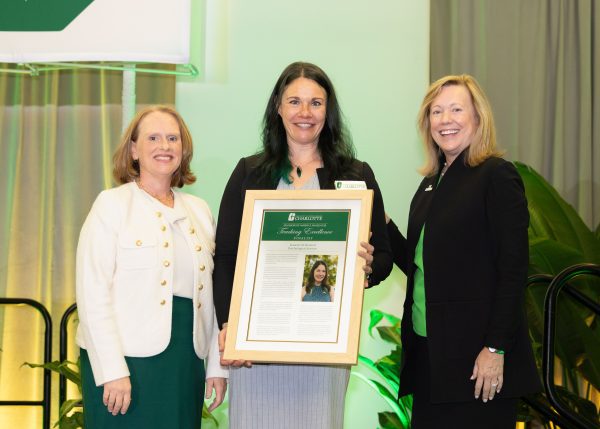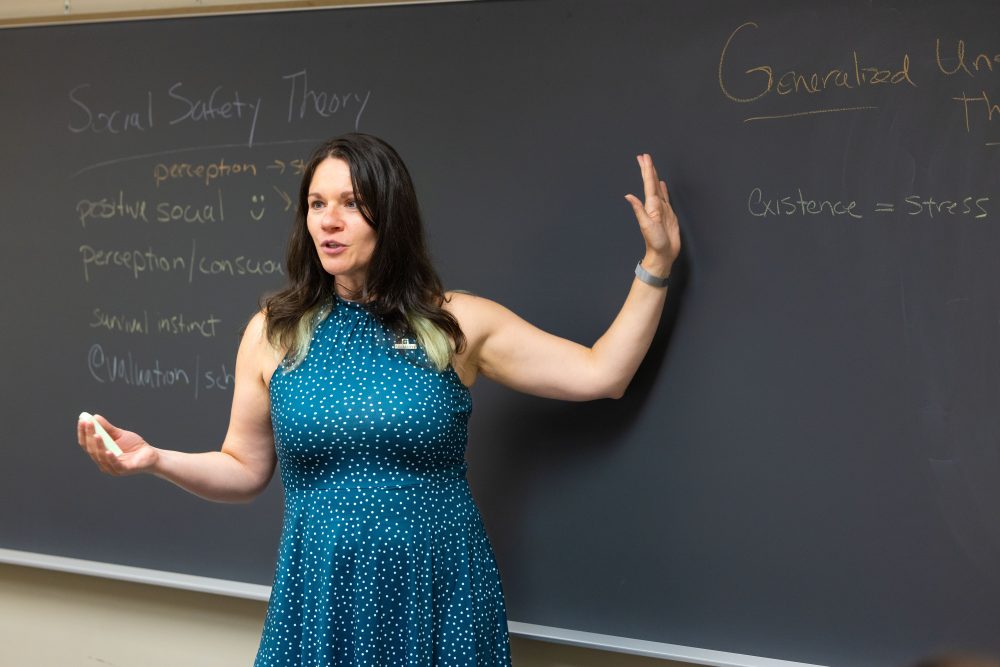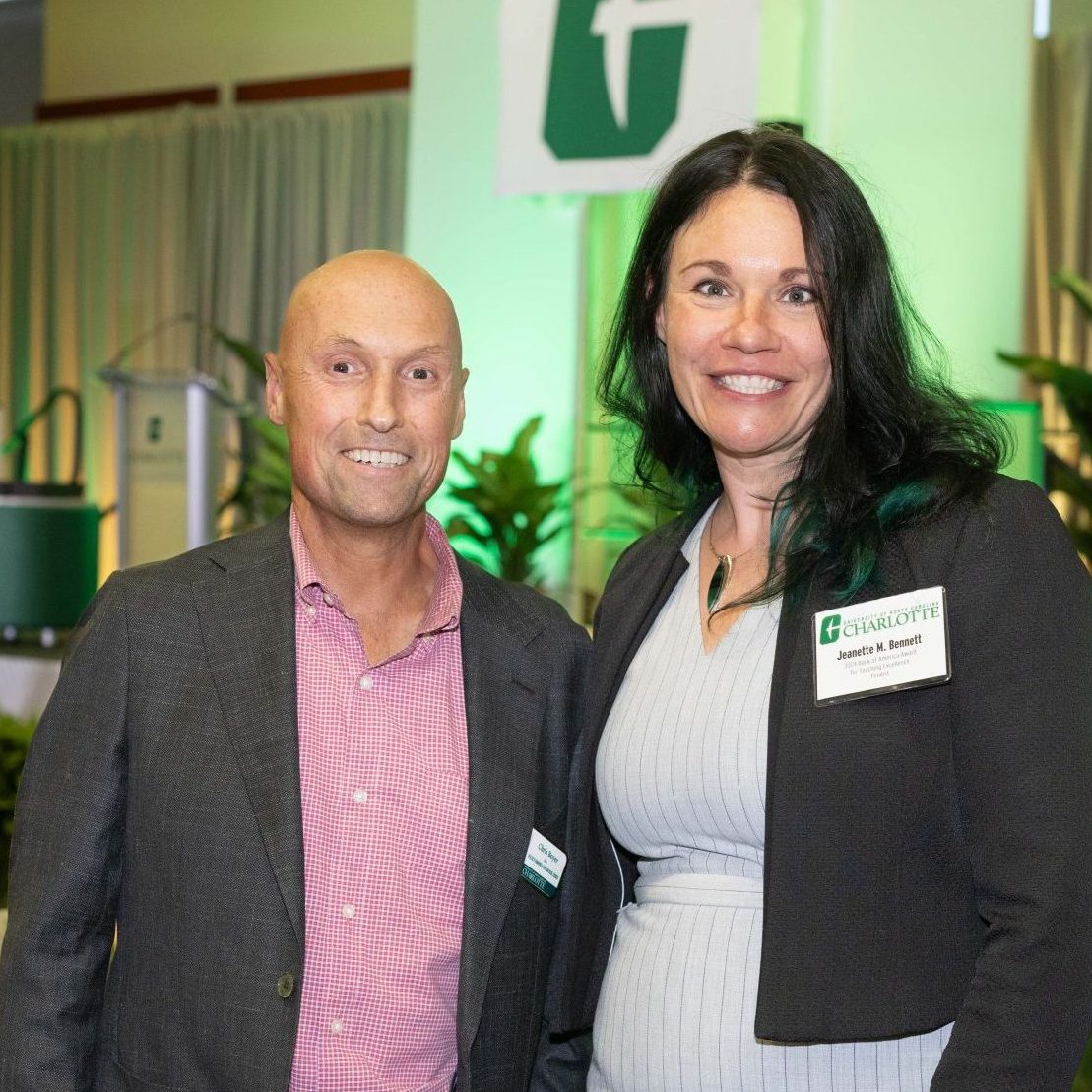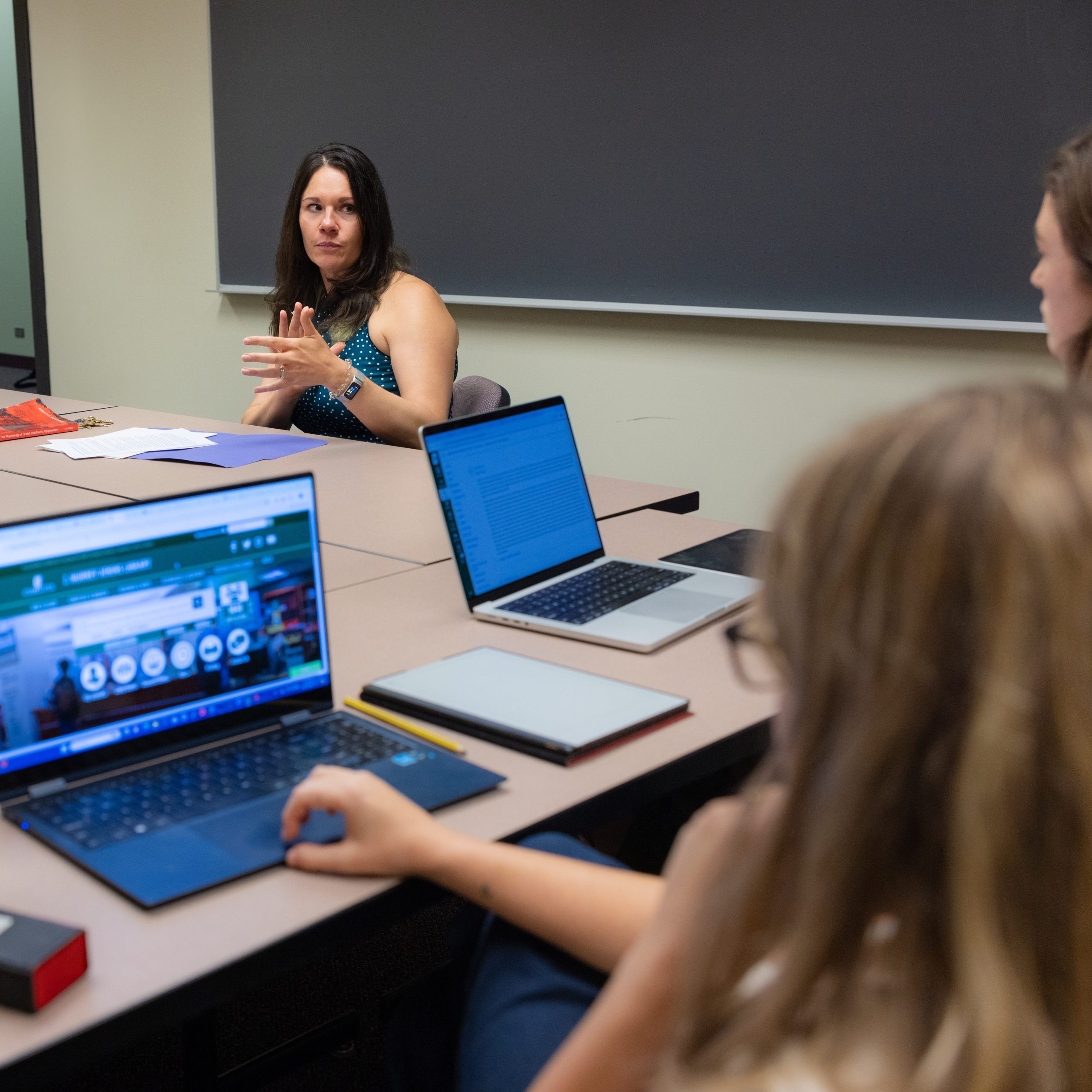Jeanette M. Bennett, Ph.D. honored as a 2024 Bank of America Award for Teaching Excellence finalist

Jeanette M. Bennett, PhD, associate professor in the Department of Psychological Science, was honored this fall as a finalist of the 2024 Bank of America Award for Teaching Excellence. The Bank of America Award for Teaching Excellence is one of the most important and prestigious traditions at UNC Charlotte, honoring outstanding tenured teachers and providing an example of the University’s commitment to excellence in teaching.
“Dr. Bennett is an intentional and effective teacher and an educator who is committed to her students and their success,” said Ryan Kilmer, professor and chair of the Department of Psychological Science in his letter of support for the award.
Bennett joined UNC Charlotte in 2012 as an assistant professor in psychology, after spending two years as a postdoctoral fellow in the Institute for Behavioral Medicine Research at The Ohio State University Wexner Medical Center, and was promoted to associate professor in 2018. Describing her career path as “non-traditional for an academic,” Bennett started her career in the health research industry after earning a B.A. in Psychology and a B.S. in Biology from Gannon University. After establishing a burgeoning career in the field, Bennett felt that she was missing the creativity of teaching and mentorship and went on to obtain a M.S. and Ph.D. in Biobehavioral Health from Penn State University, shifting her career to academia.

“The thing that makes me the most proud is creating a space for students to grow, whether that’s in the classroom or my lab, and to see students attain things that they may not have thought they could before they got here or maybe never dreamed of,” said Bennett.
Since 2017, Bennett has directed the StressWAVES Biobehavioral Research Lab and managed the Biobehavioral Core in the Department of Psychological Science. StressWAVES BRL’s projects work to unravel the complexity of perception, stress, and the behaviors associated with them in a societal context, which requires an interdisciplinary team of undergraduate and graduate research scientists. “The underlying concept driving my research lab is that variability in physiological systems drives behavior and ultimately promotes health, both physical and mental,” says Bennett.
During her time at UNC Charlotte, Bennett has received additional awards and honors. From 2020 to 2023, she held the Bonnie E. Cone Early-Career Professorship in Teaching, awarded by the Office of the Provost. In 2019, she was nominated for the Harshini V. de Silva Graduate Mentor Award. In 2017, she was named a Catalyst Fellow by the College of Liberal Arts and Sciences (CLAS), now the College of Humanities & Earth and Social Sciences, and a BRIDGES Fellow by The William and Ida Friday Center for Continuing Education, now the Digital and Lifelong Learning (DLL), at UNC Chapel Hill.

In 2015, Bennett received the Junior Faculty Development Award and was named one of the 10 Must Take Psychology Professors in Charlotte by Careers in Psychology. In 2014, she received the Junior Investigator Award from the UNC Charlotte Health Academy.
For the Department of Psychology and affiliated programs, Bennett has prepared and taught eight different undergraduate and graduate courses. In addition, Bennett has used her expertise to strengthen the biopsychology curriculum as a whole. She helped lead the development of the brain and behavior course for psychology undergraduates, as well as the applied physiology course and foundations course. “These course development efforts have been substantive and important for our undergraduate and graduate curricula,” Kilmer said. “Dr. Bennett’s hiring helped address a gap, and provide critical updated expertise, in our content coverage regarding biopsychology.”
In July 2022, Bennett transitioned into the role of associate chair for curriculum in the Department of Psychological Science, taking on additional administrative responsibilities and serving on multiple committees.

In course evaluations, students describe Bennett’s teaching style as passionate, caring, and motivating. She teaches multiple courses that may initially feel daunting to students, including Brain & Behavior, Research Methods II, and Health Psychology I, but students say they appreciate “her candor, her transparency, and how she clearly cares about our education AND well-being.”
During classes taking place online during the COVID-19 pandemic, students emphasized her empathy and understanding, stating “She also cared for us as students. She cared about our mental health and how we are doing with the stress of COVID and everything going on in the world. It was refreshing to have a professor treat us as humans and understand that we were struggling and reach out and help us.”
Bennett’s academic expertise influences her approach to teaching, as she understands the biopsychosocial responses to adversity and the impacts on health and wellbeing. Even in her large undergraduate classes consisting of around one hundred students, she ensures she learns student names, especially those who are consistent attendees. She does not force students to be present or take attendance, as she believes that a forced learning environment is not conducive to increasing real, productive, and intentional student engagement.

“Dr. Bennett puts particular weight on bringing empathy and understanding to the classroom,” said Kilmer. “With those qualities as a foundation, she aims to create a culture in which she can engage students’ thinking, empower each student’s unique inquiry and information processing, and subsequently observe their learning and evolution.”
In addition to coursework, Bennett has been an active student mentor, providing hands-on research opportunities for undergraduate and graduate students. By helping students develop lab-based competencies, she prepares them for their future educational and professional paths. Bennett has also provided research experiences that have led to important scholarly products for students, including the supervision and chairing of undergraduate Honors Theses, University Honors Senior Portfolios, and master’s theses and dissertations.
Bennett’s impact on students spans departments at UNC Charlotte. has served on extensive doctoral and master’s student committees across Health Psychology, Psychology, Biology, Health Services Research, Kinesiology, Public Health Sciences, Counseling, and Computing & Information Systems. “Dr. Bennett reflects positively on our department and our university and she makes multifaceted contributions to our educational mission,” said Kilmer.
Bennett supports students on their academic paths by providing opportunities for them to contribute to scholarly works. Bennett has contributed to over fifty research publications and book chapters since 2008, and during her time at UNC Charlotte she has published fourteen articles and three book chapters with thirteen graduate student authors or co-authors. Fourteen of these works have students as the lead authors, and two articles have three different undergraduates as co-authors.

Bennett has over forty presentations at national or international conferences with student first- or co-authors, and her students have been honored for their research through awards including the Honors College Avenir Foundation Scholarship, P.E.O. Scholar Research Grant, Psi Chi & APA Edwin B. Newman Graduate Research Awards.
“I hope that when students remember my classes, even though they thought initially that maybe the class information was tangential to their lives, that it actually is very important to their lives,” Bennet said. “It can help make biology and neuroscience concepts fun, exciting and memorable. We are all mini neuroscientists of our own lives and I try to remind them of that.”
Bennett’s favorite memory of teaching at UNC Charlotte is actually a note on the board in her classroom. When asking students for feedback in a previous course, a student responded with a note stating, “I expected to hate your class, but it is actually my favorite one this semester. You’re a great professor. Keep up the good work.” This moment stands out to her, as it goes back to how she wants to connect with students and be remembered for. “I want to flip people’s scripts and help them see new possibilities and things that they haven’t even contemplated before they walked into my classroom or my lab,” she said.
Bennett’s expertise has been sought out by media outlets at UNC Charlotte, the city of Charlotte, and beyond. She has been quoted in articles by The New York Times, Oprah Daily, and Everyday Health’s DailyOm. She most recently appeared on Charlotte’s WSOC-TV Channel 9 News to discuss Hurricane Helene’s Impact on Mental Health.